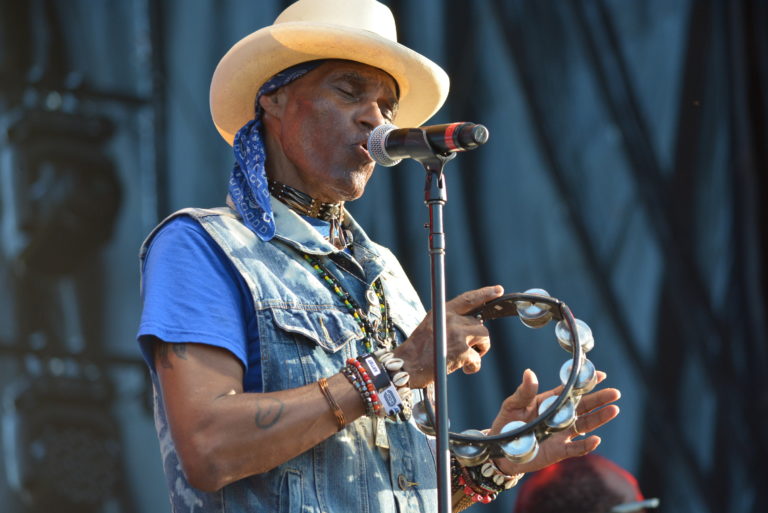Reflections: Cyril Neville

photo by Dean Budnick
The youngest Neville Brother looks back on a lifetime of New Orleans funk.
The Neville Brothers’ grand finale took its time to unfold. Their fade, after three and a half decades as a performing unit, started in 2012 and became clear in 2013, when the family band performed at the New Orleans Jazz & Heritage Festival sans star vocalist Aaron Neville, who’d bowed out to concentrate on his solo career. A more formal farewell took place two years later, when the siblings—Aaron, Art, Charles and Cyril—staged “Nevilles Forever: A Celebration of the Neville Brothers and Their Music” at New Orleans’ Saenger Theatre.
But this storied chapter in American roots music truly closed for good on April 26, 2018, when Charles, the second oldest member of the clan—arriving after Art and before Aaron—passed away after battling pancreatic cancer. The group’s lauded saxophonist was 79.
Nearly a year later, Cyril, the youngest by seven years, is reflecting on Charles’ influence. “He was one of my first teachers, one of the most brilliant intellects I’ve ever encountered in my life,” he says. “At an early age, he was encouraging me to read things that were past my age. There ain’t nothing like a brother, and to be a little brother with three older brothers, sometimes it was great and sometimes it was kind of maddening.”
Mostly though, it was a nonstop musical party. As a youth, Cyril took note as Art’s career took off with local band The Hawketts, and then watched Aaron score a national No. 2 hit with the ballad “Tell It Like It Is” in the late-’60s.
“None of the cats was doing it for money,” Cyril says about his older brothers. “They were doing it for the love of music.” When the opportunity came for Cyril, who sang and played percussion, to join keyboardist Art’s band The Meters—which also included guitarist Leo Nocentelli, bassist George Porter Jr. and drummer Joseph “Zigaboo” Modeliste—he was ready.
“The band that became The Meters started in the same living room where the Nevilles grew up,” Cyril says. “We all hung out together and all got interested in music around the same time.” The Meters became Allen Toussaint’s session band at Sansu, his production company with Marshall Sehorn, playing with people like Robert Palmer, Little Feat and Patti LaBelle. “While they were in the studio, they started putting down these little rhythmic things that they came up with,” he recalls.
The Meters signed to the New York-based Josie Records and, over the next several years—until Art and Cyril left in 1977 to focus on their family band—they became one of the most important and influential funk bands in the country, playing for a Paul McCartney record-release party, scoring hits with tunes like “Cissy Strut,” and opening tours for The Rolling Stones.
“That was the Stones at the height of their career,” says Cyril, “and it was one of the highlights of my life. I learned a whole lot about the music business, the whole nine yards, seeing how that camp was run.”
The advent of The Neville Brothers in ‘77 was, perhaps, inevitable. Cyril credits Art with being the catalyst. “No Art Neville, no Meters, no Neville Brothers,” he says. “I could go on and on. It all circles back to Art Neville.”
The quartet and their accompanists became one of the most reliably creative and exciting funk-soul bands ever, releasing more than a dozen albums and performing all over the world. They were an institution, especially in their hometown. The reason for the Nevilles’ longevity? It’s simple, says Cyril: “Family. You learn that nothing is more important than that. That was why we were able to stay together. That and the fact that the music meant what it meant.”
However, Cyril Neville isn’t simply content to savor the past: He’s also looking toward the future, keeping busy with new, diverse projects. In 2011, he got together with guitarist/ vocalists Devon Allman and Mike Zito to form Royal Southern Brotherhood, a band that leaned more toward the blues-rock of Devon’s father Gregg Allman than the funky soul of The Meters and Nevilles. “It was nice for a little while. We wrote some really good music together and had a few nice tours and everything,” Cyril says, “but then it got to the point where I thought I’d like to use the rest of my time doing what I would like to do.”
One of those things is Cyril Neville’s Swamp Funk, a band featuring his son Omari on drums. There’s an album in the works, including tracks recorded with Dr. John and the late Toussaint. In 2018, Cyril released two related collections of the music that he’d recorded on his own Endangered Species label—a comprehensive five-CD box set and a single-disc distillation. He’s also collaborated with the popular NOLA band Galactic and is putting together a tribute album to Louis Armstrong, with a reggae record, a folk album and what he calls “a straight-up New Orleans street beat record” also in the planning stages.
“He’s always been the bridge between the generations,” Aaron’s son Ivan says. “He’s only 10 years older than me and never seemed as old as my dad or other uncles when I was a teenager.”
Cyril Neville turned 70 last October, but he doesn’t have any intention of slowing down. His career is now managed by his daughter, and that’s given him a boost. “I’m actually being shopped in the right places,” he says. “This is the first time that I’ve ever been managed by somebody who I feel really cares and who knows me and exactly what I do, what I could give, and has the best ideas about how to get that to the public. That’s where I’m at right now. There’s a lot of forward motion.”
This article originally appears in the April/May 2019 issue of Relix. For more features, interviews, album reviews and more, subscribe here.




















